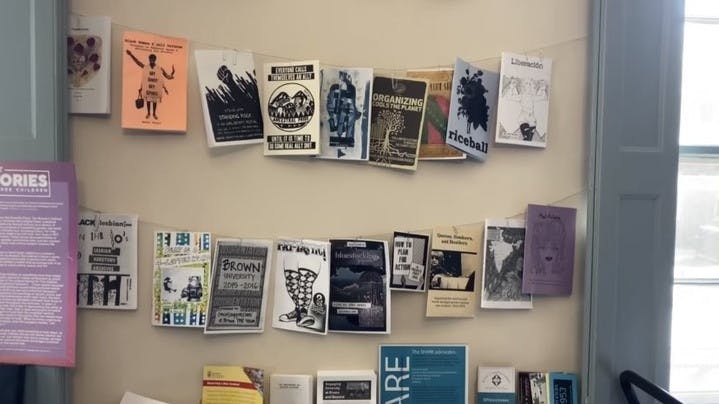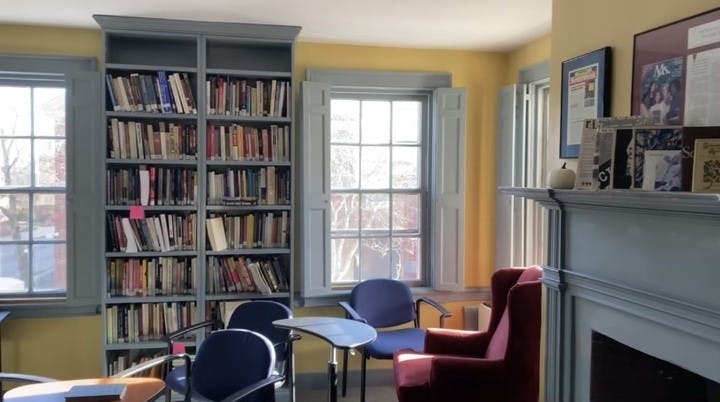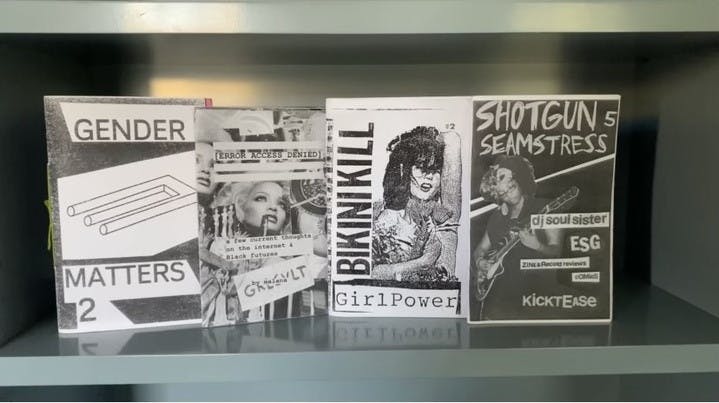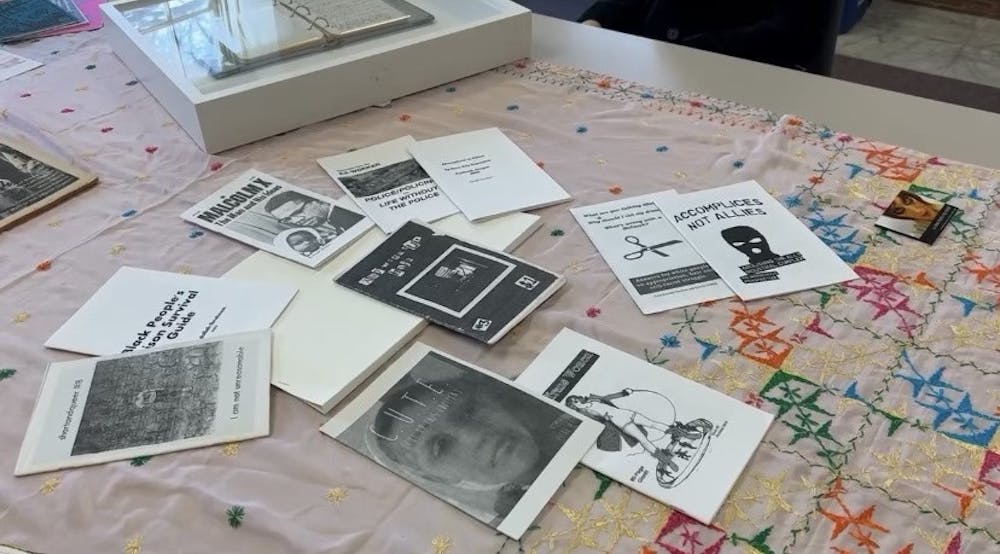Content warning: This article includes references to an instance of sexual harassment.
Feminist education, eating disorders and sex toys are just a few of the topics covered by Malana Krongelb ’19’s eponymous zine collection.
The collection — which Krongelb began in 2015 — is housed at both the John Hay Library and the Sarah Doyle Center for Women and Gender. Looking beyond academic texts and leather-bound books, zines — self-made and distributed magazines — have become increasingly visible as a resource for students on various topics, including feminism, intersectionality and more.
Some of the titles in the collection include “BUILDING: A DIY Guide to Creating Spaces, Hosting Events and Fostering Radical Communities,” which features email templates, tips on how to deal with the police and an activism glossary and asks readers to imagine societies that embrace plurality. In “GUT,” Sayuri Gomez shares her experience immigrating from Mexico to the United States and the pressure she felt to look a certain way. “GIRL POWER! Lesson Plans for Feminist Educators” provides ways for teachers to address feminism, intersectionality and self-expression within their classes, which includes zine-making.
In an interview with The Herald, Krongelb said that she had “never heard of zines” before college. During her first year at the University in 2013, when activism around Title IX policies garnered attention on college campuses, Krongelb was sexually harassed by a graduate student, she said. That same semester, while working for the University-based feminist magazine Blue Stockings, Krongelb helped put together a zine highlighting the stories of survivors at Brown.
The zine, titled “Silent & Voice,” put Krongelb on “a path of healing,” she said. “I recognized the power of zines personally.”
After being absent from Brown for a year on medical leave, Krongelb returned to zines as a source of healing and empowerment — they were “what made me feel better the last time,” she said. Inspired by a class assignment on zine collections, Krongelb sought a grant to curate a collection herself.

The SDC eventually helped Krongelb purchase materials for cataloging the zines and allocated space to store them, according to center Director Felicia Salinas-Moniz. “The collection allows for engagement with contemporary issues around gender and sexuality in an approachable and tactile way,” she explained.
“I wanted to make the collection explicitly leftist,” Krongelb said. “I wanted it to really focus on people of color and marginalized folks that weren’t really represented at the University.”
But, she explained, that does not mean the collection is a perfect reflection of her personal opinions. “There are always going to be parts you end up disagreeing with.”
For Mary Murphy, Pembroke Center archivist, the far-reaching scope of Krongelb's collection reflects the center’s mission. “We are here for the study of difference,” which comes in the form of gender, sexuality, race, religion and class, she said. By pushing the boundaries of which subjects can fall under feminist studies, Murphy believes the zine collection highlights “the way feminist studies entangles itself in every facet of our lives.”
Murphy took an interest in Krongelb’s “circulating zine collection,” noticing that many of the titles Krongelb had curated were rare. Murphy then approached Krongelb with the idea of creating a “sister collection” in the Hay “for preservation,” she said.
The two then began to curate and organize the new collection.
“In my dream, the collections would match perfectly,” Krongelb said. But because many zines didn’t have duplicates and some older zines had to be preserved, the two collections ended up different.
At the Hay, the collection is organized in a very particular manner, according to Heather Cole, head of Special Collections instruction and curator. Zines are organized by their broad topics rather than by author, title or call number.
“I wanted the people who wrote the zines to … be empowered by the way the collection was organized,” Krongelb said, explaining that traditional cataloging methods can be inaccessible. “And I wanted it to be relatively easy for students to navigate.”
According to Cole, Krongelb’s collection, as well as the broader zine archive at the library, have been used extensively by students. “We very often have a box from the collection on hold for five (or) ten students at a time,” she said, adding that students have engaged with the materials as “inspiration for all kinds of work.”
For Cole, Krongelb’s collection is crucial in “democratizing” the knowledge available at the University. The collection “is very intersectional … in a way that many of our existing collections have not been,” she said
“Brown has been collecting special collections … for a very long time. But a lot of (the collections), like Brown itself, has excluded quite a few people,” Cole added. Beyond Krongelb’s collection, the Hay has continued to actively collect zines for separate collections. “Now we are trying to repair that, to address those gaps.”
To continue expanding the library’s collection, Cole invites students to contribute.

In her zine-filled office at the Pembroke Center, Murphy traced the origins of zines back to the history of diaries. For her, zines are “a form of self-expression that is unregulated,” she said.
“They are mixing together personal reflections and thoughts with political commentary and artwork,” Murphy added.
For Krongelb, zines “are not objective and nor should they be.” While the word “zine” has been popularized, Krongelb believes it is important to highlight the transformative, accessible and democratic power of the medium.
“They shouldn’t be expensive, they shouldn’t be glossy and fancy. They should be made cheaply and for the people,” she said. “If it ain’t cheap, it ain’t punk.”

At SDC, Tanvi Anand ’26, the center’s student librarian, tells a similar story. “Zines, to me, represent carving out a space and expressing myself in ways that I didn’t really have the opportunity to do in my environment,” she said.
“Zines provide an alternative to dominant discourses surrounding knowledge, power and justice,” Anand said. “Anyone can make a zine and distribute it.” One of her latest projects compiles World War II newspapers, local political pamphlets and interviews with punk artists.
While browsing through the center’s zine collection, Anand highlighted one zine with a familiar name: “(ERROR ACCESS DENIED) by malana.” Krongelb, that is.
During her time at the University, Krongelb was insistent that she would not become a librarian. This past December, she completed a master’s degree in Library and Information Science at Simmons University. Today, Krongelb is focused on digital literacy education, volunteers at a prison library and was recently named as a juror for the Coretta Scott King Book Awards.
Building the collection, she said, “improved my personal perspective and relationship to feminism.” To Krongelb’s life, zines were — and still are — transformative.

Julia Vaz was the managing editor of newsroom and vice president on The Herald's 134th Editorial Board. Previously, she covered environment and crime & justice as a Metro editor. A concentrator in political science and modern culture and media, she loves watching Twilight (as a comedy) and casually dropping the fact she is from Brazil.





